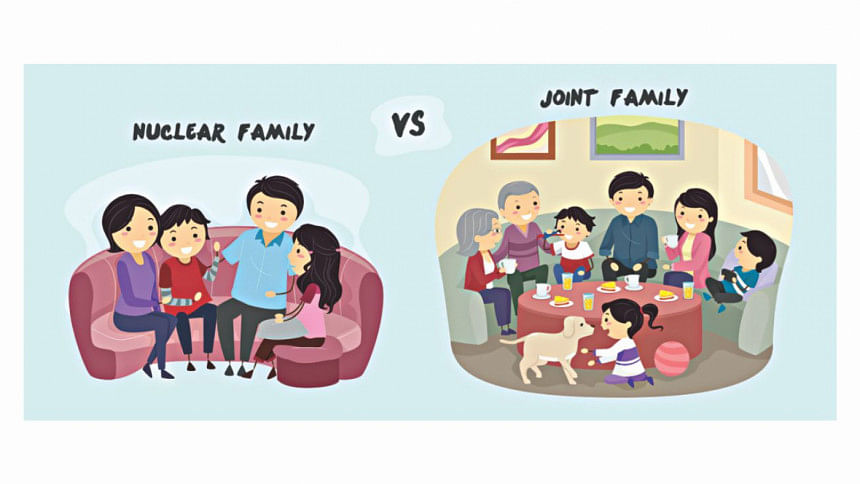The pros and cons of nuclear family

A nuclear family is not simply a group of people tied together by parenthood or partnership, but rather, it is a necessity to maintain healthy social relationships in this millennial era.
In today's world, effective and efficient use of time has become a crucial aspect of not just one's professional, but personal space as well, which can also suggest why more and more people are opting to have nuclear families. Of the myriad reasons behind its popularity, one of the most important one is the perceived lack of privacy for a couple, and as people hold privacy above all else, joint families can be far from ideal.
Since nuclear families are more favourable, there must also be a number of advantages perceived by people who prefer being in one. According to Zyma Islam a journalist, "Personal space is integral for mental peace." Growing up in a joint family, she was never really able to get much privacy and thus, as an adult she craves and values it the most. An introvert by nature, she very clearly sees the benefits of living in nuclear families. Sharing, adjusting and compromising became much-needed traits she had to adopt while living in such a dynamic environment, especially with extended members of her family.
On the contrary, Ramisa Rahman Amreen, grew up in a joint family, but later on, her parents settled for a smaller one, and her ideas on the advantages are a bit different. First and foremost, there is proper understanding between family members, making communication easier. With more interaction, children are able to share more aspects of their lives with their parents, promoting closely tied bonds with one another. However, living in a joint family actually comes with a lot of responsibilities. As the parents are responsible for their children, they are also liable for their children's actions as well. This is something parents in nuclear families do not have to face.
Put simply, the more individuals there are in a family unit, the higher the chances of disagreements and rising tensions amongst each other. Perhaps that's why we often see today's version of 'living under one roof' translates into families living in separate apartments in the same building or area.
That being said, nuclear families, to a certain point, make people isolated, and that mainly happens because the bond between the extended family does not have a chance to grow, leading to indifference amongst members of the family. Even though the immediate family has a strong bond, it may not be the same case for the extended one, which can be considered a major setback in comparison to living in joint families.
Nuclear families also cannot provide the same regulations for children as joint families can. For some, that would be an ideal situation. However, in current times, some restrictions are very important for children, which can be maintained by the parents, as well as the grandparents or aunts and uncles. This ensures proper discipline, and instils the fear of consequences in children, which is not always easy for the parents to do alone.
Both Zyma and Ramisa had to deal with some change in the family structure at one point of their life. For Zyma, it was something she desired and made her happy, whereas Ramisa's heart still belongs to the joint family life she has left behind. But they both agree that more people in our country will increasingly opt for living independently, without families. They also believe that there will come a time when their parents will move in with them. Just like them, there are so many young adults out there who know that it is something that will happen and they are ready to accept their responsibilities, regardless of living in a joint or a nuclear family.
Photo: Collected

 For all latest news, follow The Daily Star's Google News channel.
For all latest news, follow The Daily Star's Google News channel. 



Comments